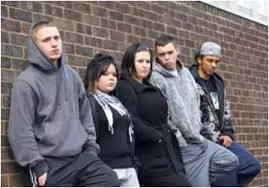
Adolescence is one of the most difficult and turbulent periods of life for both parents and their children. During their transit from childhood to adult life, teenagers seek to self-identify and try to find their place in the world; they learn to interact with their society, adopt social norms, and define their life priorities. Unfortunately, this process is not always smooth. Some teenagers experiment with substances, and some get involved in illegal activities. One of the biggest problems a teenager can get into during adolescence is becoming a part of a teenage gang.

✅ AI Essay Writer ✅ AI Detector ✅ Plagchecker ✅ Paraphraser
✅ Summarizer ✅ Citation Generator
Why would a teenager even want to join a gang? Experts believe it might be connected to a desire to gain authority and respect in the teenage society hierarchy: gangs usually attract adolescents who want to belong to a respected community that provides security and anonymity, and at the same time tend to be susceptible to peer pressure. Dr. Kenneth Sladkin, a child and adolescent psychiatrist in the Fort Lauderdale area, says that despite the high numbers of teens in gangs, the majority of them still do not accept criminal group standards: of the estimated eight hundred thousand gang members in the United States, the majority of their teenage members rather might be described as criminal “wannabes.” “For these kids, the gangs are almost like social clubs. They meet in school and talk about who’s in this gang or that gang. They’re not the youngsters who are staying out all night and getting mixed up in crime and turf wars,” believes Dr. Sladkin (HealthyChildren).
Does it mean the problem of teenagers participating in gangs is not worth attention? No. The percentage of actual criminals among teens is still high; besides, even passive participation in a gang (like described by Dr. Sladkin) still increases the chances that a teenager will become entangled in drugs (addiction or trafficking), vandalism, theft, and robbery (HealthyChildren). What is even more disturbing, even if a teenager quits a gang, the likelihood of him or her getting involved in illegal affairs in adulthood remains high. According to research, teenagers who joined a gang in adolescence had three times higher chances to receive illegal incomes between ages 27 and 33. This means that even if a teenager does not commit a crime now, he or she will do it later. Besides, even if they are not committing crimes, former gang members are at a three-times higher risk of developing substance addictions in a later age; they are also twice as likely to have poor health and be in need of receiving public assistance. This is not to mention a significantly lower likelihood of successfully graduating from school (University of Washington).
For those parents concerned about whether their child might become a member of a gang, there is a set of criteria regarding a child’s behavior and/or appearance to pay attention to; if at least some of the following is true in your case, you can suspect your child of being a member of a gang:
- dropping grades and/or problems at school
- problems with police
- radically changing friends and the closest environment
- sudden changes in clothing, especially involving specific color schemes and gang symbols
- not paying much attention to family or usual family activities
- hiding or not willing to talk about their extracurricular and outdoor activities
- possessing significant amounts of money while being unemployed and being unable or unwilling to explain their sources (Teen Help)
Joining a gang might be an extreme way of teenage riot; adolescence is the time when teenagers seek to establish themselves in a social hierarchy, and being a part of a gang might seem a considerable option for them. Although not all teenagers in gangs become criminals and commit crimes (mostly they are “wannabe criminals”), being a member of a gang can still lead to problems later: including substance abuse, poor health, getting involved in illegal activities, and so on. Usually, if your child has problems at school and with police, wears specific colors of symbols all the time, possesses a lot of money from unclear sources, and hides their activities from you, he or she might be a part of a gang.
References
“Teenagers and Gangs.” HealthyChildren. N.p., n.d. Web. 12 Jan. 2016.
“Negative Effects of Joining a Gang Last Long after Gang Membership Ends.” Washington University. N.p., n.d. Web. 12 Jan. 2016.
“Teen Gang Involvement.” Teen Help. N.p., n.d. Web. 12 Jan. 2016.
Follow us on Reddit for more insights and updates.





Comments (0)
Welcome to A*Help comments!
We’re all about debate and discussion at A*Help.
We value the diverse opinions of users, so you may find points of view that you don’t agree with. And that’s cool. However, there are certain things we’re not OK with: attempts to manipulate our data in any way, for example, or the posting of discriminative, offensive, hateful, or disparaging material.